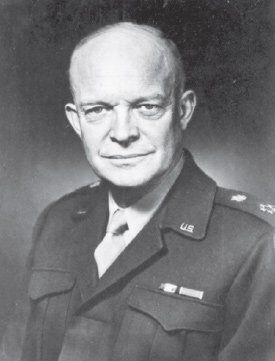General Eisenhower: A 130th Commemoration
by Diana Loski
One hundred and thirty years ago, during a memorable thunderstorm in Denison, Texas on October 14, 1890, Dwight David Eisenhower was born. He was the third son of seven whose parents were David and Ida Eisenhower. He earned the nickname “Ike” as a child, and grew up in Abilene, Kansas.
His parents were ardent pacifists, particularly his mother, who was orphaned at a young age. She spent her formative years cheerlessly passed along from relative to relative in post-Civil War America. David, Ike’s father, was quiet and reflective, a man who had been broken by a cheating business partner. He turned to farming and working in a dairy, which he disliked.
Young Ike grew up industrious, as the family of boys with little income required hard work. His favorite pastimes were reading – especially history – and football. He hoped to have a career in professional sports, but an injury stopped those dreams. He attended West Point Military Academy, largely because it provided a free education.
It was during his time at West Point that Eisenhower first visited Gettysburg while on a field trip learning military tactics. He graduated in 1915, with the rank of a second lieutenant.
He met the attractive and prestigious Mamie Doud at Fort Sam Houston in San Antonio, Texas. The couple married on July 1, 1916 and had two sons, Doud Dwight and John.
Ike was the commander of Camp Colt at Gettysburg during World War I. He had hoped to fight overseas, and was disappointed to serve his time stateside. The next war, however, took him far across the Atlantic. His parents lived long enough to see him serve as Supreme Allied Commander in Europe. Ida said, “My highest hope is that Dwight may be an instrument in bringing peace to a troubled world. 1
After the war ended in victory for the Allies, Ike and Mamie eventually settled in Gettysburg, purchasing an historic farm south of town in 1950. They spent years remodeling the property, which was in a state of neglect. Two years later, he was elected as the 34th President of the United States, with the slogan “I Like Ike”.
The 1950s were largely prosperous and peaceful for the United States, and the reason was largely because of the man who wished for peace more than most who occupied the White House.
Ike and Mamie spent some weekends away from Washington – many of them at Gettysburg, where the President hosted various heads of state. When his two terms ended, he and Mamie returned to Gettysburg.
After suffering for many years with heart disease, General Eisenhower died on March 28, 1969. Mamie passed away a decade later, on November 1, 1979. They were buried in the Eisenhower Chapel in Abilene, Kansas beside their son, Doud, who died in 1921 of scarlet fever.
It is impossible to accurately record the life of one of America’s greatest heroes. Recently, in Washington, D.C., a new statue was unveiled of the renowned general and Commander-in-Chief – one of many scattered throughout the nation. To fully grasp the influence and personality of the general and former President, however, Ike's modest boyhood home in Kansas or the inviting farm at Gettysburg are the best places. Here, the vestiges of this great man, whom we honor still, can be felt. There is yet a peace in his memory, in the midst of a troubled world.
Sources: Angelo, Bonnie. First Mothers. New York: William Morrow, Inc., 2000. Eisenhower, Dwight D. At Ease: Stories I Tell to Friends. Washington, D.C.: Eastern Acorn Press, 1967. Whitney, David C. and Robin Vaughn Whitney. The American Presidents. New York: Doubleday & Company, 1993.
End Notes:
1. Angelo, p. 96.




